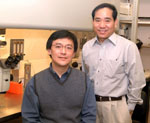Clinicians pressed for translational
science
by
Heather WoolwinePublic Relations
Federal government funding sources, namely the National Institutes of Health, are placing enormous emphasis on supporting bench-to-bedside research. MUSC scientists and clinicians must secure the best research models for swift translation of their important work concerning many ailments and diseases, according to MUSC researchers.
An example of how MUSC is responding to this task is the recently opened Xenograft Core Facility at the Darby Children’s Research Institute, which is supported by the Hollings Cancer Center. The facility is a laboratory designed to house a viable, breeding immuno-deficient mouse colony used for life saving research.
 Drs. Tien Hsu,
left, and Yong-Zhong Gong in the Xenograft Core Facility.
Drs. Tien Hsu,
left, and Yong-Zhong Gong in the Xenograft Core Facility.“In cancer research, it is incredibly important to be able to translate basic findings into treatments for patients, and it was determined that MUSC could use some more help in bridging that gap,” said Tien Hsu, Ph.D., pathology and lab medicine professor and director of the new core facility. “Researchers throughout the MUSC campus need accessible animal models for testing human disease progression and cell functions in a physiologically relevant setting, such as stem cell research, and especially cancer research. Immuno-deficient mice provide a critical model because they will not reject the human tissues that are implanted in them. It was our experience that most people want to do xenograft model testing but either lack the expertise to do so or are deterred by the high costs. We talked with cancer center leadership, including Dr. [Andrew] Kraft, and everyone was very supportive of the idea of a xenograft core facility.” Initial funding was provided in September 2005 by the Hollings Cancer Center to establish the facility.
According to Hsu, outsourcing for these types of mice often is expensive and time-consuming, and researchers are at the mercy of delivery times and climbing prices each time an order is placed. His first step in developing the new space with facility manager Yong-Zhong Gong, M.D., pathology and lab medicine instructor, and Maria Guinea, VMD, pathology and lab medicine post doctoral fellow and mouse pathology specialist, was to set up a mouse colony on the MUSC campus. Once the mice were breeding, the time to establish lab protocols and technology arrived.
“We spent an entire year doing that, testing and collaborating with other researchers and gaining the expertise needed to run this kind of facility,” Hsu said. “We offer a variety of services including a pathogen-free working area for in vivo experiments; appropriate housing and maintenance for these animals, as well as technical expertise to facilitate in vivo experiments; and we provide technical personnel to instruct or assist investigators with their mouse experiments, and perform optional services such as engrafting tumor samples or survival surgery.”
Compared to the average cost of $54 per mouse from outside facilities, MUSC researchers will see an instant difference in the pace and cost of their research, including the reduced cost of $20 per animal with the xenograft core facility on campus.
“The facility has established methodology for engraftment in sub-renal capsule space, which provides a richly vascularized environment amenable for metastasis study, as well as traditional subcutaneous implantation,” Hsu said. “Other engraftment schemes can be designed according to investigators’ special needs. We aim to provide accessible and excellent services at affordable prices.”
Meanwhile, Hsu stressed the importance of the conditions in which the animals are housed and cared during experiments.
“Dr. [Mike] Swindle [chair of the Department of Comparative Medicine] has been very supportive and has given his approval of the environment created for these research animals,” Hsu said.
Because the mice are immuno-deficient to allow for experimentation with diseases including cancer, it is imperative that their areas be kept pathogen-free, Hsu said. To assure this, special air filters, a strict schedule of care, and limiting the number of people allowed contact with the animals on a daily basis keep them in stable condition until needed for research.
Eventually, Hsu and his colleagues will expand the lab offerings via collaboration with the opening of a small animal imaging services lab. Once those are in place, researchers and lab specialists will be able to examine the implanted tumors or cells inside the animals in real-time as opposed to looking for answers post mortem.
For more information about the Xenograft Core Facility or to request services, visit http://www.musc.edu/pathology/Xenograft/.
Friday, Jan. 26, 2007
Catalyst Online is published weekly,
updated
as needed and improved from time to time by the MUSC Office of Public
Relations
for the faculty, employees and students of the Medical University of
South
Carolina. Catalyst Online editor, Kim Draughn, can be reached at
792-4107
or by email, catalyst@musc.edu. Editorial copy can be submitted to
Catalyst
Online and to The Catalyst in print by fax, 792-6723, or by email to
catalyst@musc.edu. To place an ad in The Catalyst hardcopy, call Island
Publications at 849-1778, ext. 201.